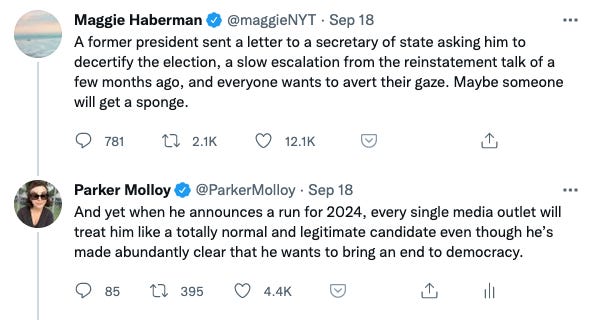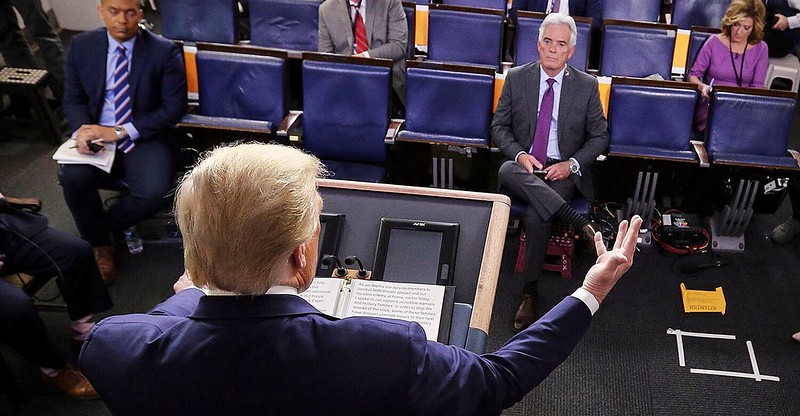The date was September 23, 2020, and President Donald Trump had just finished delivering a short set of remarks in the White House’s briefing room.
He was there to discuss Johnson & Johnson’s announcement that it had begun stage three trials on its COVID-19 vaccine. It was an opportunity for him to brag a bit about the progress made in the U.S. compared to European countries, and with good reason. The 7-day average for deaths sat at 736 per day, down from the April peak of 2,118 deaths per day (by the time he’d leave office, that number would rocket all the way up to 3,000 per day). He used the opportunity to slam his opponent, Joe Biden, and dance on the recently-deceased Supreme Court Justice Ruth Bader Ginsburg’s grave by teasing his choice to replace her.
As Trump opened the floor to questions, White House reporter Brian Karem saw a chance to ask something that had been weighing heavily on the minds of many Americans.
“Mr. President, real quickly: Win, lose, or draw in this election, will you commit here, today, for a peaceful transferal of power after the election?” asked Karem. “And there has been rioting in Louisville. There’s been rioting in many cities across this country — red and — your so-called red and blue states. Will you commit to making sure that there is a peaceful transferal of power after the election?”
It was an opportunity for Trump to quell concerns that he’d try to cling to power in the event of a loss. Earlier that same day, The Atlantic published Barton Gellman’s piece explaining how Trump, in a loss, might try to interfere with the counting of the electoral votes on January 6 by citing the Electoral Count Act. Karem’s and Gellman’s worries were well-founded, as we would soon find out.
But that day in the briefing room, Trump did not calm the anxious nation’s worries but exacerbated them in the worst possible way. From the White House transcript:
TRUMP: Well, we’re going to have to see what happens. You know that. I’ve been complaining very strongly about the ballots. And the ballots are a disaster. And — and —
REPORTER: I understand that, but people are rioting. Do you commit to making sure that —
TRUMP: Oh, I know. I know. Yeah, no, we want —
REPORTER: — there’s a peaceful transferal of power?
TRUMP: We want to have — get rid of the ballots and you’ll have a very trans- — we’ll have a very peaceful — there won’t be a transfer, frankly; there’ll be a continuation.
The ballots are out of control. You know it. And you know who knows it better than —
REPORTER: No, sir. I don’t know that.
TRUMP: — anybody else? The Democrats know it better than anybody else.
He actually said to “get rid of the ballots,” said “we’ll see” when asked if he’d accept the results, and added that “there won’t be a transfer [of power], frankly; there’ll be a continuation.” It was a remarkable, horrific thing for a candidate to say. After months of trying to rev up his base with false claims that the Democrats were trying to rig the election against him, he made clear just how far he was willing to push his lie.
The following day, not a single one of the country’s major newspapers deemed the story important enough to merit a spot on the front page. The New York Times put it on page A15; Washington Post and The Wall Street Journal covered it on A4; The Los Angeles Times put it on A6, and neither USA Today nor Chicago Tribune covered it at all in their print editions. This shouldn’t have come as much of a surprise as just weeks earlier Trump encouraged his supporters in North Carolina to commit voter fraud by voting twice, only for that story to be shrugged off by the mainstream press, as well.
“I don’t think that question had the legs it should’ve on day one,” Karem wrote when reached by e-mail. “But it kept coming back to haunt him. Jonathan Karl followed up the next day and Kayleigh McEnany tried to avoid the question by calling me deranged or something equally banal,” he continued.
“The fact is that particular question was the precursor to everything that followed – the Big Lie, the Insurrection and what we’re living with as far as Trump being in denial about the election results to this day. Donald Trump is a cancerous conman. On that day he told us exactly how dangerous he was and if we listen we can take appropriate actions to excise this political cancer. His statement is a harbinger of doom – if we fail to listen,” he added.
It’s hard to argue that Karem was wrong for being worried about what would follow a Trump loss. After all, Trump was the same man who said weeks ahead of the 2016 election that he would accept the results of that contest — “if I win.” He was also the same man who, months before that, had accused Sen. Ted Cruz of “fraud” during the Iowa caucuses. He was the same man who had long claimed that the Emmys were rigged because his TV show, The Apprentice, never won. He was the same man who, in 2012, responded to Mitt Romney’s loss to President Barack Obama by tweeting that “We should have a revolution in this country!” and urging his followers to “march on Washington and stop this travesty.” So of course Trump was going to reject the results of the election if he lost.
Karem’s question should have set off alarm bells. It didn’t. Trump lost, just as anyone who had glanced at the polls knew would happen, and not only refused to concede but tried to use the powers of the presidency to strongarm his way to a second term in office by taking advantage of how much of U.S. politics require adherence to informal norms and possession of a sense of shame.
The press wasn’t prepared for 2020 — it’s looking even worse for 2024
In July, reporter Julia Ioffe published a piece detailing the sadness of some mostly-anonymous White House reporters over the “boring” Biden administration. It’s become increasingly clear how much certain reporters wish Trump would have won re-election (or successfully pulled off his coup attempt), and how much they’re willing to do to try to make sure he ends up back in the White House in January 2025.
The New York Times is practically salivating over the idea of Trump running in 2024, as its “When Will Trump Answer the Big 2024 Question?” piece makes clear.
For my part, I’ve been trying to express my own concerns about how the press will handle another Trump run for president by highlighting just how absurd it would be to cover Trump as a standard candidate worthy of standard coverage. In a just world, Trump would not be eligible to run again, at minimum. That’s something the House and Senate had the power to do but didn’t. But rather than have debates over whether his crimes should result in him being imprisoned (there’s a strong case for it) or merely exiled from the world of politics, the media will almost certainly just pretend that they’re covering a run-of-the-mill politician. If he runs.

But maybe I’m just being too pessimistic, too cynical. Maybe there have been lessons learned and the press is better prepared to counter Trump’s chaos. So I asked someone I knew would give me a straight answer: Brian Karem.
“If Trump announces that he’ll be running in 2024, do you have confidence that the press, generally, is up to the task? And if not, what can newsrooms do to change that?” I wrote in my email to Karem.
As I suspected, the answer was “no.”
“No. The press is not up to the task overall – though individual journalists are,” he wrote. “We have to quit playing the ‘access game’ with politicians. Quit trying to cozy up to them and treat them as our employees rather than our masters. The press gives up its power almost without question to those who are elected to office.
“Being a Trump sycophant is horrifying. But it is no surprise – considering the lack of experience of many reporters covering everything from National Security to Congress to the President.
“Gone are the days of reporters with many years of experience covering these offices and serious issues. There are plenty of reporters with master’s degrees covering the federal government, but few who’ve covered a city council meeting, or spent time digging through the files of the county clerk’s office – or any who’ve ever spent time on a crime beat.
“More experienced, independent journalists with a diversity of backgrounds is needed to effectively cover the federal government – and that is sorely lacking today.”
